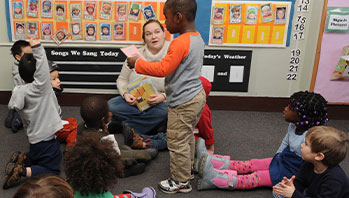- word cards (with small illustration; begin with the letter "y")
- marker
- riddle
MA Standards:
Foundational Skills/RF.PK.MA.1: With guidance and support, demonstrate understanding of the organization and basic features of printed and written text: books, words, letters, and the alphabet
Head Start Outcomes:
Literacy Knowledge/Alphabet Knowledge: Recognizes that the letters of the alphabet are a special category of visual graphics that can be individually named.
PreK Learning Guidelines:
English Language Arts/Reading and Literature 7: Develop familiarity with the forms of alphabet letters, awareness of print, and letter forms.
Word Play: Riddles ("y")

© Commonwealth of Massachusetts, Department of Early Education and Care (Jennifer Waddell photographer). All rights reserved.
ELA Focus Skills: Letter Recognition, Listening and Speaking, Phonological Awareness, Vocabulary
Tell children they are going to solve letter “y” riddles.
- Explain that a riddle is like a puzzle. Say, You have to listen closely to the words because they are clues to the answer.
- Tell children that riddles have a tricky answer that is sometimes hard to answer.
On chart paper, tape word cards (with small illustrations/pictures) that have have the letter "y" in them. For example pictures of yellow, baby, eye, and yo-yo. Ask volunteers to identify the pictures.
Then make up riddles for children to solve. Guide them to solve the riddle as you give the clues. For example,
I am a color,
I am very bright.
I am the color of a lemon.
What am I?
(yellow)
I am little.
There are two of me.
I am on your face.
I see every thing.
What am I?
(eye)
I am a toy.
I have a long string.
I go up and down.
I have a funny name.
What am I?
(yo-yo)
As children respond, have a volunteer circle that word card on the chart. Continue with other riddles.
Adaptation: For very young children having trouble with the riddles, you may want to hold up word/picture cards as you give each riddle so children can feel included in the activity.
Adaptation: For older children, you may want to have them work together to make up riddles and then share them with the group.
Educator Tip: Guided and independent letter, sound, and word practice continues to take place in center activities. It is helpful to set up the literacy center immediately after the direct instruction and repeat instruction before children work in the literacy center identifying letters.
